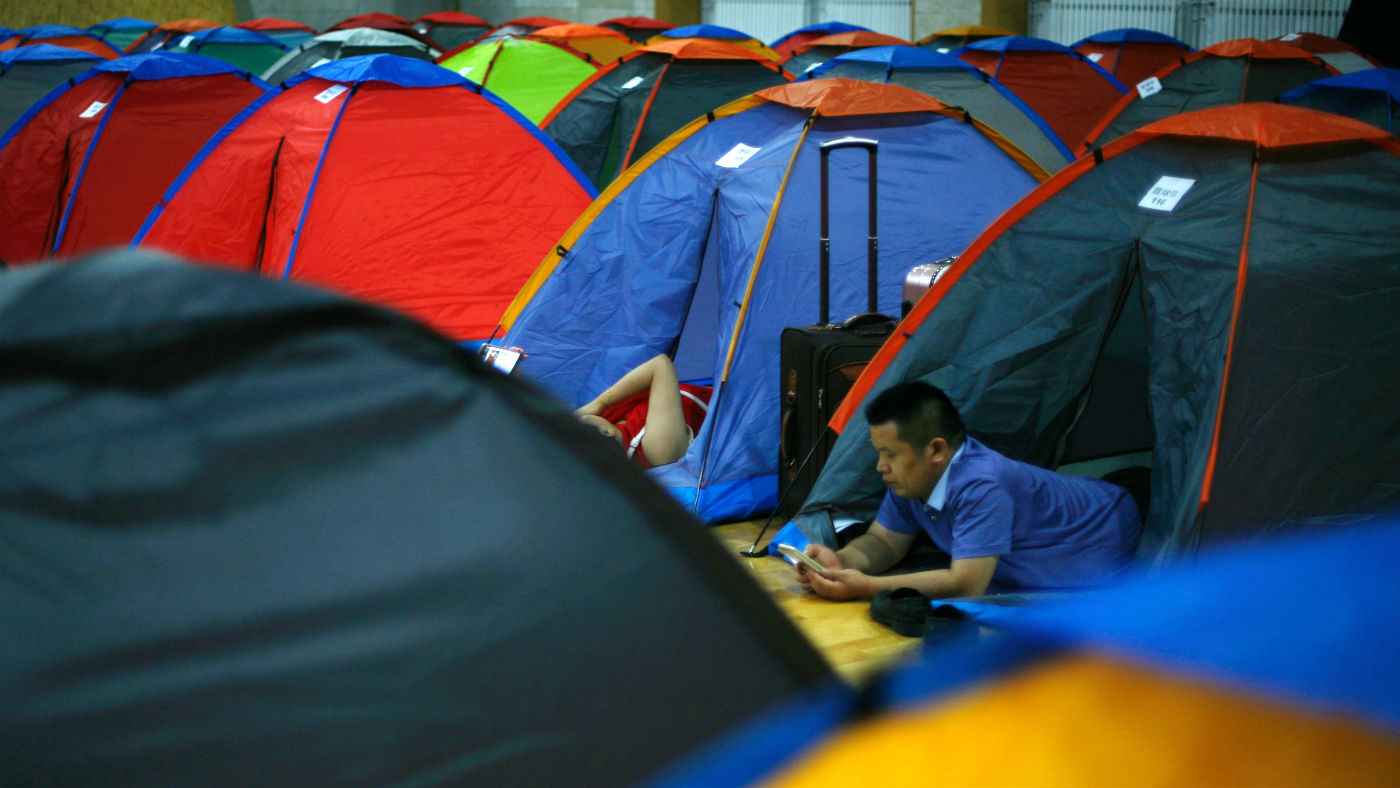Chinese universities set up campsites for anxious parents
‘Tents of love’ phenonemon sparks online debate over ‘pampered’ teenagers

A free daily email with the biggest news stories of the day – and the best features from TheWeek.com
You are now subscribed
Your newsletter sign-up was successful
A growing number of universities in China are setting up temporary camps where anxious parents of first-year students can keep an eye on their offspring.
The tent cities started springing up around university campuses several years ago, and now some colleges are taking the lead by arranging formal facilities where parents of new students can camp out, the New York Times reports.
Tianjin University in northern China has been setting up what it calls “tents of love” inside its gym since 2012.
The Week
Escape your echo chamber. Get the facts behind the news, plus analysis from multiple perspectives.

Sign up for The Week's Free Newsletters
From our morning news briefing to a weekly Good News Newsletter, get the best of The Week delivered directly to your inbox.
From our morning news briefing to a weekly Good News Newsletter, get the best of The Week delivered directly to your inbox.
The temporary camp, which this year is hosting more than 1,000 people, is equipped with air-conditioning, drinking water, and shower facilities.
It has long been common for Chinese parents to accompany their teenage children to university, and the institutions who offer “tents of love” say they are simply easing the burden on poorer families who would struggle to afford paid accomodation.
However, for critics “they epitomise the non-independence of China’s post-1990s generation”, Manya Koetse wrote in 2016 for What’s on Weibo, a blog which tracks talking points on Chinese social media.
Many argue that China’s one-child rule, relaxed in 2014 and fully lifted in 2016, has resulted in a pampered generation of “little emperors” reliant on their parents and unready to enter the adult world.
A free daily email with the biggest news stories of the day – and the best features from TheWeek.com
One new Tianjin student, 18-year-old Yang Zheyu, “had his mother at his beck and call [in the campsite], ready to bring him bowls of instant noodles, buy him soap and scrub the floor of his new room”, the New York Times reports.
“I feel safer when she’s here,” he said.
Rapidly rising standards of living have led to massive increases in the number of young Chinese enrolling in higher education - often the first in their family to attend university and frequently travelling hundreds of miles from home to do so, adding to parental anxiety.
However, some parents expressed other motivations for accompanying their children to their new homes, such as helping move their baggage or simply curiosity about their new home.
One father staying in the tent city on Tianjin campus told the New York Times that he had made the journey because he “wanted to see what the university looked like” rather than to act as a helicopter parent to his first-year daughter.
However, even the most benign motivations have been known to cause headaches for university officials. “In some cases, families are so proud of their college-going kid that they arrive at the university with grandparents, uncles, aunts and cousins”, says What’s on Weibo.
While many universities are expanding their “tents of love” campsites, others have taken the opposite tack - placing a total ban on parents accompanying their children to university.
-
 Political cartoons for February 16
Political cartoons for February 16Cartoons Monday’s political cartoons include President's Day, a valentine from the Epstein files, and more
-
 Regent Hong Kong: a tranquil haven with a prime waterfront spot
Regent Hong Kong: a tranquil haven with a prime waterfront spotThe Week Recommends The trendy hotel recently underwent an extensive two-year revamp
-
 The problem with diagnosing profound autism
The problem with diagnosing profound autismThe Explainer Experts are reconsidering the idea of autism as a spectrum, which could impact diagnoses and policy making for the condition
-
 Epstein files topple law CEO, roil UK government
Epstein files topple law CEO, roil UK governmentSpeed Read Peter Mandelson, Britain’s former ambassador to the US, is caught up in the scandal
-
 Iran and US prepare to meet after skirmishes
Iran and US prepare to meet after skirmishesSpeed Read The incident comes amid heightened tensions in the Middle East
-
 Israel retrieves final hostage’s body from Gaza
Israel retrieves final hostage’s body from GazaSpeed Read The 24-year-old police officer was killed during the initial Hamas attack
-
 China’s Xi targets top general in growing purge
China’s Xi targets top general in growing purgeSpeed Read Zhang Youxia is being investigated over ‘grave violations’ of the law
-
 Panama and Canada are negotiating over a crucial copper mine
Panama and Canada are negotiating over a crucial copper mineIn the Spotlight Panama is set to make a final decision on the mine this summer
-
 Why Greenland’s natural resources are nearly impossible to mine
Why Greenland’s natural resources are nearly impossible to mineThe Explainer The country’s natural landscape makes the task extremely difficult
-
 Iran cuts internet as protests escalate
Iran cuts internet as protests escalateSpeed Reada Government buildings across the country have been set on fire
-
 US nabs ‘shadow’ tanker claimed by Russia
US nabs ‘shadow’ tanker claimed by RussiaSpeed Read The ship was one of two vessels seized by the US military